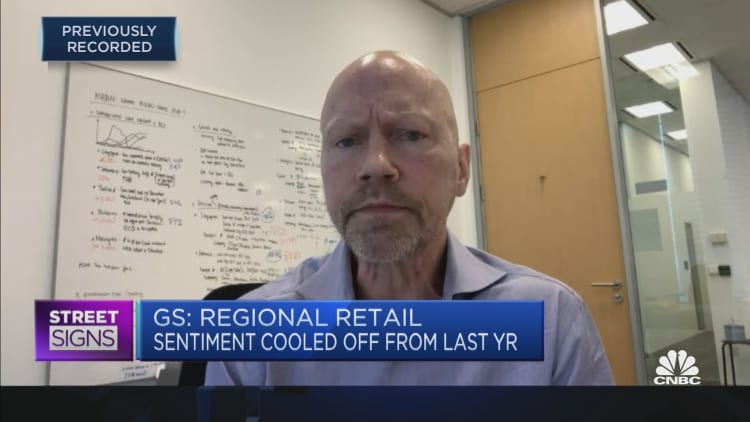
SINGAPORE — Strong mainland Chinese investor interest has propelled stocks in Hong Kong to a "very strong start" in 2021, according to Goldman Sachs' Timothy Moe.
As of Monday's close, the Hang Seng index is up more than 10% so far this year. In comparison, the Shanghai composite on the mainland has gained about 4.35% while the Shenzhen component has also advanced around 8.57%.
"The amount of money coming in (to Hong Kong) is a record high," Moe, co-head of Asia macro-research and chief Asia-Pacific regional equity strategist at the investment bank, told CNBC's "Street Signs Asia" on Friday.
The "connect" programs allow mainland investors to trade shares in Hong Kong through the Shanghai and Shenzhen exchanges. The programs allow investors in Hong Kong to do the same with stocks listed in the mainland. There is a daily quota set for the total monetary value of trades in both directions.
The top five most actively traded Hong Kong-listed stocks by mainland investors in January as of Monday were: tech juggernaut Tencent, on-demand delivery services firm Meituan, China's largest chipmaker SMIC, telco China Mobile and electronics maker Xiaomi — according to a tally by CNBC based on data from Hong Kong Exchanges and Clearing.
Among those companies, China Mobile, SMIC as well as Xiaomi have been blacklisted by Washington for their alleged military ties.
Citing a weekly chart of southward flows from mainland China into Hong Kong, Moe said those levels have gone to "very, very significant new highs" and served as the "most important liquidity factor" driving stocks in the city.
Still, the Goldman strategist expressed doubts the phenomenon would be sustainable.
More upside in Hong Kong: Pictet
Not everyone agrees.
Andy Wong from Pictet Asset Management said the surge in mainland investor interest could result in a "gradual shift" in the major participants in the Hong Kong markets.
"With increasing southbound flows and low positioning by international foreign investors, mainland capital could play an increasingly significant role in Hong Kong," Wong told CNBC in an email.
"Much like a stock IPO process, mainland China funds investing in HK stocks could see multiple times over subscription," said Wong, senior investment manager at Pictet Asset Management's international multi-asset team. "This highlights the scale of the capital flow in the mainland."
Beyond their scale, capital from the mainland could also be more "nimble" in terms of their reaction to information, Wong suggested.
Investors from the mainland may also be more willing to "give benefit" to new themes as well as have a different view on state-owned companies that foreign investors may have shied away from.
As such, Pictet sees investment opportunities in Hong Kong including:
- Leading sectors with "scarcity value" for mainland Chinese investors. In this case, mainland investors are willing to pay a premium for stocks listed in Hong Kong or the international markets, as they have limited access to them. Examples include those in new growth segments such as leading technology, health care, education and property management.
- A valuation "discount" in Hong Kong ranging from between 10% and 70% to mainland-listed stocks.
"Geopolitical tension could continue to affect markets, but given ultra-low interest rates, healthy economic growth, and supportive policies, we think investors need to stay invested," Wong said. Hong Kong stocks are "one of the areas we find opportunities in."
— CNBC's Evelyn Cheng contributed to this report.


